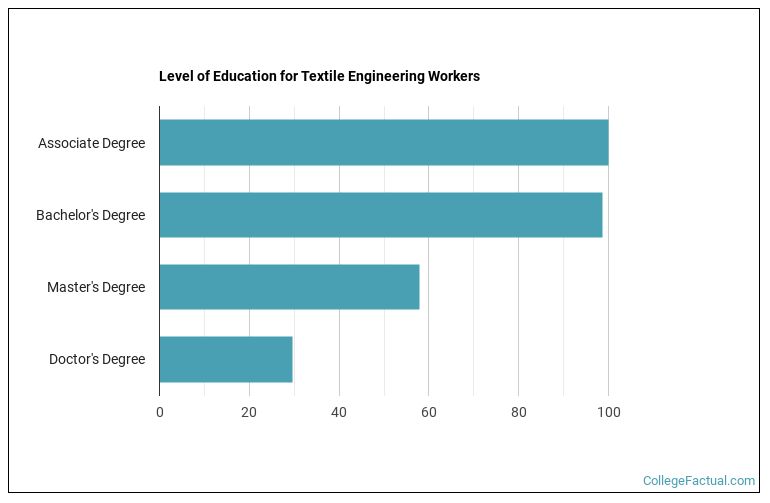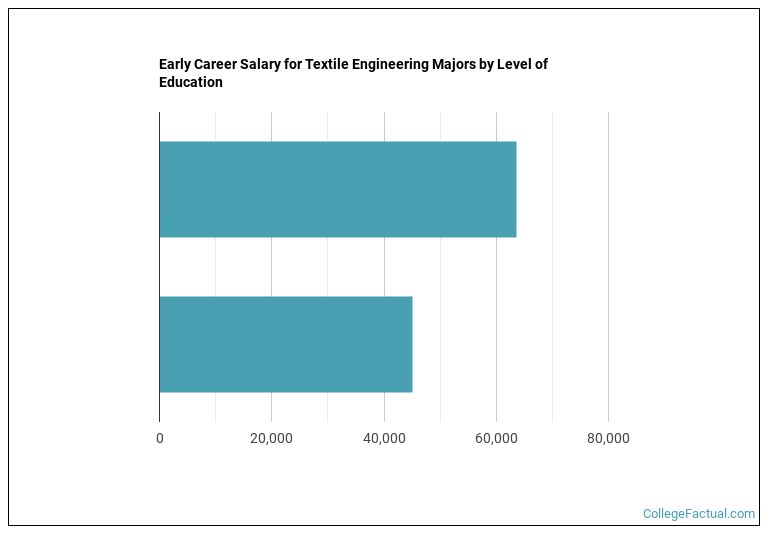 by our College Data Analytics Team
by our College Data Analytics TeamMaterials from the clothes you're wearing to the couch in your living room were developed by a textile engineer. If you're interested in testing and developing both natural and synthetic fibers to create new types of materials, Textile Engineering is for you.
Textile Engineering majors use their math and science backgrounds to analyze and understand everything there is to know about textile fibers. You will take classes in industrial engineering, molecular synthesis, chemical manufacturing, and computer science to prepare you for an exciting career in this growing field.
Textile Engineering was the 298th most popular major in the 2021-2022 school year. Colleges in the United States reported awarding 297 degrees in this year alone. Our 2025 Best Textile Engineering Schools ranking analyzes 1 of these schools to determine the best overall colleges for textile engineering students. Explore this or one of our many other custom textile engineering rankings further below.
Students who are successful in Textile Engineering have a strong background in mathematics and science. You will be working on developing synthetic materials as well as improving current fibers used in textiles; critical thinking and creativity will help you in these tasks. Like other engineering fields, the ability to work in a team and manage multiple projects will make you successful.
Textile Engineering careers are often fulltime jobs in and office or research lab. Professionals typically carry a 40-hour workweek.
Employers prefer professionals who have previous experience, making internships and co-operative education programs necessary. These experiences will allow students to get a feel for the career in the real world and improve their skills before graduation.
A high school diploma or equivalent is typically required for most textile engineering degree programs and many students will need a minimum GPA and SAT/ACT score depending on the school. Specific textile engineering careers may require a certain level of degree attainment or additional certifications beyond that.
There are various different levels of textile engineering degrees. Textile Engineering programs offered by schools range from a to a , which is the highest textile engineering degree you can get. Different textile engineering degrees vary in how long they take.
| Degree | Credit Requirements | Typical Program Length |
|---|---|---|
| Associate Degree | 60-70 credits | 2 years |
| Bachelor’s Degree | 120 credits | 4 years |
| Master’s Degree | 50-70 credits | 1-3 years |
| Doctorate | Program required coursework including thesis or dissertation | At least 4 years |
A bachelor's degree is the most common level of education achieved by those in careers related to textile engineering, with approximately 36.4% of workers getting one. People currently working in careers related to textile engineering tend obtained the following education levels.
| Level of Education | Percentage of Workers |
|---|---|
| Bachelor’s Degree | 45.5% |
| Master’s Degree | 27.1% |
| Doctoral Degree | 12.8% |
| Post-Baccalaureate Certificate | 5.1% |
| Post-Doctoral Training | 4.9% |
58.0% of textile engineering workers have at least a master's. View the chart below to get an idea of what degree level most of those in textile engineering careers have.

This of course varies depending on which textile engineering career you choose.
There are many possibilities for Textile Engineering graduates. While some may go into clothing manufacturing, others have developed gear for outer space or underwater exploration, biocompatible organs for medical uses, and have created synthetic materials to replace overused organic materials. With the advancements in technology, the field is expanding and new career paths constantly emerging.
Depending on the type of job you wish to have after graduation, job outlook can vary. However, those with previous experience in the field will be more competitive in the job market.
Want a job when you graduate with your textile engineering degree? Textile Engineering careers are expected to grow 6.8% between 2016 and 2026.
The following options are some of the most in-demand careers related to textile engineering.
| Occupation Name | Projected Jobs | Expected Growth |
|---|---|---|
| Architectural and Engineering Managers | 190,000 | 5.5% |
| Engineering Professors | 54,600 | 14.7% |
| Materials Engineers | 27,500 | 1.9% |
Recently graduated textile engineering students earned an average of $46,902 in <nil>. Earnings can range from as low as $45,078 to as high as $63,645. As you might expect, salaries for textile engineering graduates vary depending on the level of education that was acquired.

Salaries for textile engineering graduates can vary widely by the occupation you choose as well. The following table shows the top highest paying careers textile engineering grads often go into.
| Occupation Name | Median Average Salary |
|---|---|
| Architectural and Engineering Managers | $148,970 |
| Engineering Professors | $113,680 |
| Materials Engineers | $96,930 |
With over 9 different textile engineering degree programs to choose from, finding the best fit for you can be a challenge. Fortunately you have come to the right place. We have analyzed all of these schools to come up with hundreds of unbiased textile engineering school rankings to help you with this.
One of 41 majors within the Engineering area of study, Textile Engineering has other similar majors worth exploring.
| Major | Annual Graduates |
|---|---|
| Textile Sciences & Engineering | 297 |
| Related Major | Annual Graduates |
|---|---|
| Mechanical Engineering | 44,794 |
| Electrical Engineering | 26,528 |
| Civil Engineering | 20,655 |
| Computer Engineering | 16,954 |
| Biomedical Engineering | 13,222 |
Image Credit: By Unhindered by Talent under License More about our data sources and methodologies.